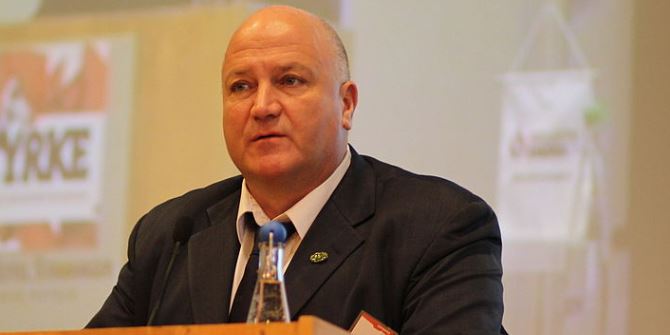 Early this morning Bob Crow, head of the Rail, Maritime and Transport (RMT) union, passed away at the age of 52. He presided over a union that saw its membership rise while other unions floundered and were forced into merger. Personally and politically, he delivered a winning combination that few others will be able to match. Here, Gregor Gall looks back at his life and achievements, writing that Crow’s death leaves both the RMT and the more militant side of the union movement with a problem.
Early this morning Bob Crow, head of the Rail, Maritime and Transport (RMT) union, passed away at the age of 52. He presided over a union that saw its membership rise while other unions floundered and were forced into merger. Personally and politically, he delivered a winning combination that few others will be able to match. Here, Gregor Gall looks back at his life and achievements, writing that Crow’s death leaves both the RMT and the more militant side of the union movement with a problem.
Bob Crow was a big man, not just physically but also industrially and politically. For some he was public enemy number one. For others, he was a working class hero. He was certainly amongst the most awkward of the ‘awkward squad’ of new union leaders that rejected ‘new’ Labour and supine partnership with employers. He was the best know union leader of his generation despite the fact he led a very small union. Many activists in other unions wished they had a leader like Bob Crow.
It was his unashamed bluntness in defending his members’ interests in an age on anodyne sound bites and his members’ potential power that made Crow able to punch well above his weight. His members on trains, the underground and buses had the power to immediately halt their employers’ operations. This was used to good effect by the RMT under Crow’s leadership since 2002 when he was elected general secretary and well before as assistant general secretary from 1991. Good pay rises were gained, conditions defended and although not all redundancies were halted, the terms for going were significantly improved.
As a result RMT membership rose from by over 25,000 in his time while other unions floundered and were forced into merger. It was not just those with obvious industrial muscle that the RMT represented. Under Crow, low paid cleaners on the railways and tube were organised by the RMT and, through hard battles, they secured wages above the minimum and living wages. Even in the North Sea, catering workers, drillers and divers did well with the RMT.

It would be easy to make Crow synonymous with striking. But he was the pragmatic yet principled master of using ballots for industrial action to create the necessary leverage with employers to get better deals without striking. He ended up not using mandates for action far more than he did call strikes with them. He was also pragmatic. Negotiators would say that when he turned up to meetings, you knew he wanted to do a deal.
This was the militant mandate he was elected on after the tenure of previous leader, Jimmy Knapp, who was seen as being too soft with employers. But he was also a strategic one for the RMT became one of the best defenders of public transport, by allying its members with the downtrodden traveller. Under Crow, it led the other rail unions in this work.
Crow was quite humble and shy away from the radio or television studio where he played up the unrepentant militant character. But it was that forcefulness in person and practice that made him so beloved by his members. It also allowed him to play a leading role on the political left.
Originally a member of the Communist Party, he then joined Arthur Scargill’s Socialist Labour Party (SLP) when it was founded in 1996 as the Communist Party crumbled. But he left the SLP when it became stillborn, then characterising himself as a communist without a communist party. He supported his union’s Scottish branches which affiliated to the Scottish Socialist Party even though this meant the RMT’s expulsion from Labour. And he backed numerous attempts to build a leftwing electoral alternative Labour in England and Wales. As a Millwall supporter, he very much operated on the basis of ‘they don’t like us but we don’t care’.
Crow’s death leaves both the RMT and the more militant side of the union movement with a problem. Personally and politically, he delivered a winning combination that few others will be able to match. There are no obvious well-known and well-tested officials in the RMT to replace him (partly because Crow was such a commanding presence). Former president, Alex Gordon, is probably the best replacement that the RMT has.
For the union movement, there are no other union leaders who can wield such industrial power and combine with it a radical cutting political edge. Mark Serwotka of the PCS public servants’ union is the closest but his case for his members is – because it needs to be – based on argument and reason and not on industrial muscle. Crow was never humbled in an industrial dispute as his fellow left-winger, Len McCluskey, was last year at Ineos in Grangemouth, Scotland. Crow, again unlike, McCluskey, was also politically consistent, never fearing the consequences of what he believed it was right to say. So while Crow is irreplaceable, the demand for what he stood for and achieved his still not satiated. At least that provides the opportunity for some likeminded people to try to fill his shoes.
Note: This article gives the views of the author, and not the position of the British Politics and Policy blog, nor of the London School of Economics. Please read our comments policy before posting.
About the Author
 Gregor Gall is Professor of Industrial Relations at the University of Bradford
Gregor Gall is Professor of Industrial Relations at the University of Bradford






